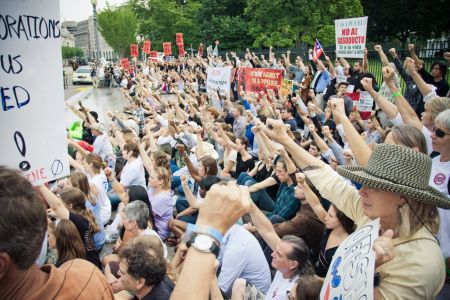En français: http://bit.ly/Ji1EFz
The creative, courageous and inspiring Quebec student movement will today weave its way through Montreal's Earth Day rally, mixing red and green, merging demands for a freeze on tuition with respect for the earth and those most impacted by climate change. Let the meeting not remain accidental, but deepen and flourish.
Our country has always been divided by solitudes of nation, religion, and language, but no two solitudes are as important to overcome today as this: the fight against an unjust economy and the fight against climate change.
It has never been more urgent to make the connection. The old mentality may have told us to fight our battles separately: Let environmentalists deal with the environment; let workers and students deal with the economy. But a new mentality tells us this is the same fight, because the crises of the climate and the economy have the same root: putting profits before people and the planet.
This must be our generation's quiet awakening.
If students squarely in the red is a warning our economic model is failing them, then climate change is a terrifying expression—the ultimate red alert—that the economy is failing the earth. This economic model that celebrates greed above all else is not just making education inaccessible, but it will make our planet uninhabitable.
It says to us: each person for himself; make the students shoulder the burden; and let people stricken the world-over by climate change-induced droughts, storms, flooding and crop-failures suffer their fate.
The neoliberal economic model that commercializes education is also the model that will turn the St Lawrence valley into an industrial shale gas experiment. That will turn the north of Quebec into a mining and forestry sacrifice zone. That will turn the gulf of St Lawrence into an oil pumping site. And that will turn the province into an eastward launching pad of the Alberta tar sands, a carbon bomb.
Science tells us that this model of business as usual—of perpetual growth and greed, of constant expansion and extraction—is spilling so much carbon into the atmosphere that it will ensure cataclysmic climate change. It insists we find alternatives.
The real solutions to the climate crisis will come in creating an economy that serves everyone and our ecology: closing deepening inequalities; funding a strong public sphere that includes mass public transit and free education; creating good, green jobs that decrease our dependence on fossil fuels; and restraining the reckless power of corporations and banks that profit off the privatization of our schools and the pollution of the planet.
We need to end the reign of oil in Ottawa, and its influence in Quebec city. The federal government now hands-out $1.4 billion a year to the world's richest and most polluting oil companies, when such a hand-out to students could begin a system of free education in Quebec and across Canada.
Climate change adds great urgency to all these demands for social, economic and ecological justice. Because we must reduce our carbons emissions rapidly, time is short. Climate change must thus be a spark to remake our economy on a very tight deadline.
The values of our budding social movements— solidarity over individualism, reciprocity over hierarchy, cooperation over competition— should orient our vision for a clean energy economy. This movement will be stronger when it is united. When it finds solutions simultaneously to the crises of the economy and ecology. When it is green as well as red.
During POWERSHIFT 2012 this October 26 to 29, thousands of youth from across the country will converge in Ottawa to force these issues onto the national agenda, to fight for a clean energy future that is socially and economically just. If the spirit and power of Quebec's spring blossoms, and spreads across Canada, we can achieve it.



